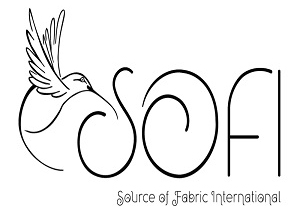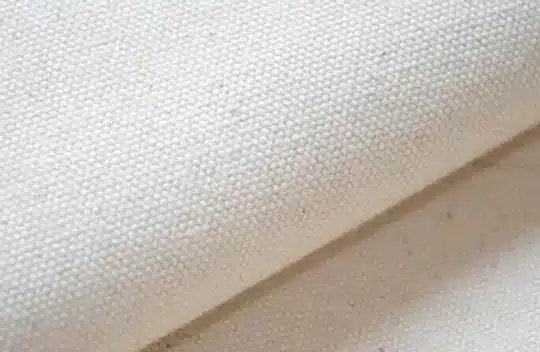For generations, canvas fabric has been a mainstay in the textile business due to its strength, resilience, and adaptability. Canvas, which was first used for sails, tents, and military equipment, has become a popular fabric with many uses. These days, people use canvas for a wide range of products, including industrial goods, outdoor gear, home décor, and fashion. This article explores the characteristics, varieties, and applications of canvas fabric, highlighting why it remains one of the most widely used textiles globally.
What is Canvas Fabric?
Usually composed of cotton or linen, the canvas is a plain-weave fabric that can also include synthetic fibers like polyester or nylon in more recent iterations. The main characteristics that distinguish canvas from other textiles are its substantial weight and resilience. People attribute the canvas’s distinctive durability and resistance to deterioration to its finely organized weave. Its usefulness increases further because it is somewhat water-resistant, especially when coated with materials like wax or acrylic.
Canvas is available in a range of weights and qualities, from lightweight materials for upholstery and clothes to heavier materials for tarpaulins, tents, and sails. Canvas’s adaptability makes it appropriate for a broad range of uses in various sectors.
Canvas Fabric Types
Cotton Canvas: Made entirely of cotton fibers, this is the most popular kind of canvas. Cotton canvas is perfect for clothing, purses, shoes, and home décor since it is soft, pliable, and breathable. It is ideal for producing vibrant patterns and personalized prints because it is also reasonably simple to dye.
Polyester Canvas: Unlike cotton, manufacturers make this type of canvas from synthetic fibers, which enhance its durability and water resistance. Applications where weather resistance is essential, like outdoor furniture, camping equipment, and boat covers, frequently employ polyester canvas.
Waxed Canvas: Manufacturers treat this type of cotton canvas by applying a layer of wax, which enhances its strength and water resistance. People frequently use waxed canvas for making tarps, tents, coats, and sturdy backpacks. Over time, the wax coating develops a distinctive patina, adding character to the fabric.
Duck Canvas: Unlike regular cotton canvas, manufacturers weave duck canvas with a heavier, tighter pattern, giving it greater strength and durability. People often use duck canvas in industrial settings for items like outdoor gear, upholstery, and heavy-duty clothing.
Canvas Fabric’s characteristics
Durability: Known for its resilience, canvas is a heavyweight fabric. People favor this material for products that are worn frequently, such as tents, shoes, and bags, because it resists abrasion.
Water Resistance: Although cotton canvas has the ability to absorb water, treated canvas types, such as waxed or acrylic-coated canvas, are extremely water-resistant, which makes them ideal for outdoor products that must endure dampness and rain.
Breathability: Cotton canvas works well for summer apparel, tents, and bags because it is soft and breathable.
Flexibility: Canvas fabric maintains its structural integrity even when bent into various shapes, despite being heavy-duty.
Eco-Friendly: Compared to synthetic textiles, natural canvas composed of cotton or linen is more sustainable because it decomposes naturally.
Typical Applications for Canvas Fabric
Canvas’s versatility and durability allow for an almost limitless variety of applications. The following are a few of the most popular uses:
Fashion & Apparel: The fashion industry makes substantial use of canvas, especially for accessories, footwear, and casual apparel. Jeans, coats, and purses are frequently made from denim, a kind of cotton canvas. In streetwear fashion, canvas sneakers, such as those made by Converse and Vans, are iconic.
Bags and Accessories: Making strong, long-lasting bags is one of the most popular applications for canvas. Canvas messenger bags, totes, and backpacks are renowned for their resilience to regular usage. Additionally, they are a popular option for marketers due to their ease of customization with designs, prints, and embroidery.
Upholstery: Canvas is frequently used for furniture upholstery, particularly in outdoor environments. Particularly when treated for UV and water protection, it gives chairs, couches, and cushions a tough yet fashionable appearance.
Outdoor Gear and Tents: Canvas remains the preferred fabric for camping gear and outdoor equipment, as people have used it for sails and tents for many years. It is ideal for use in hammocks, tarps, and tents due to its strength and water resistance.
Home Décor: Items like curtains, cushions, and slipcovers are frequently made from canvas cloth. It is a desirable and useful option for making long-lasting home furniture because of its flexibility and color retention.
Uses in Industry and Commerce: Canvas is also essential in the industrial and commercial domains. It is utilized in anything from heavy-duty clothing and aprons to conveyor belts, protective covers, and tarps.
Benefits of Canvas Fabric
Cost-effective: Canvas offers a cost-effective option, providing durability and adaptability at a reasonable price compared to other heavy-duty textiles like leather or synthetic substitutes.
Long-Lasting: The endurance of canvas items is well-known. Canvas products like tents, shoes, and backpacks can survive for many years if properly maintained.
Customization: Canvas is perfect for personalized goods like branded clothing or custom bags because it is simple to print on, dye, and embroider.
Sustainability: Compared to synthetic materials, natural canvas composed of cotton or linen is more environmentally beneficial because it is biodegradable.
In conclusion
One of the most adaptable and resilient textiles available is still canvas. Its strength, weather resistance, and flexibility make it a dependable option for a variety of uses, including fashion, outdoor gear, home décor, and industrial settings. There is a canvas kind for almost every application, ranging from heavy-duty duck canvas for industrial use to lightweight cotton canvas for accessories. For those looking to enhance their canvas products, fabric printing services can bring vibrant designs and unique patterns to life, perfect for custom applications.
Source of Fabric provides a wide range of premium materials for individuals looking for canvas textiles of superior quality for a variety of applications. We offer the greatest range of canvas fabric at affordable costs to satisfy your demands, whether you’re a designer, producer, or do-it-yourself enthusiast. Discover our selection now to enjoy a canvas of unparalleled quality!


